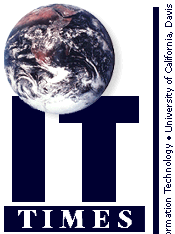
Improving Network Access From Off Campus
Pilot Readies for Take-Off
In March, with the launch of the next phase of the Remote Access Pilot project, all tenure-track faculty and senior lecturers will have the opportunity to test software-controlled modems. This is one of a series of pilots that Information Technology is conducting to evaluate the costs, benefits, and feasibility of remote access alternatives to the campus network.
Facilitating Teaching and Research
The Remote Access Pilot is for faculty who connect to the campus network from off campus for the purposes of teaching and research. It was developed to evaluate the instructional and research benefits of newer remote access technologies, and in response to the continuing congestion on the modem pool. The pilot offers participants access to 33.6Kbps modems (with 56K and ISDN capabilities) and a lower ratio of users to modems. In exchange, the data furnished by participants' use of the pilot system through June 1998 will help identify longer term solutions and future funding options for remote access for all UC Davis network users.One of the primary goals is to determine the level of support necessary for all participants to take full advantage of the service. The first indication of the need for a high level of technical support surfaced when the first group of faculty began to participate in the pilot last fall. To access and use the software-controlled modems, many had to convert and reconfigure their software and hardware. This, in a few cases, required several hours of technical assistance from the support team. Clearly, participants' needs for support varied greatly, depending in part on their own technical background, the equipment they used to access the newer modems, and the level of support available in their departments. To evaluate longer term technical support models, the initial group of 23 faculty was expanded in February to include a number of departmental Technology Support Coordinators (TSCs). This next phase of the pilot will help determine the costs associated with support alternatives and identify the most appropriate support infrastructure.
Preparing for the Pilot
Within the next few weeks, tenure-track faculty and senior lecturers will receive information on the pilot, instructions on how to access the system, and participation requirements. (Visit the a HREF="http://access.ucdavis.edu">Remote Access Web site for updates and further information.)The pilot team has developed a number of materials to help faculty prepare for and take advantage of the service:
- Hardware and software configuration recommendations are designed to help simplify the initial set-up process.
- Information about new-style LoginIDs is now linked to the Remote Access Web site.
- A working draft of a future Recommended Solutions document entitled "Telecommuting via Modem: A Suggested Approach" is posted on the Remote Access Web site. The document outlines the issues that participants in the current phase of the pilot had to consider when reconfiguring their systems for modem usage.
Matthew Matuszak of Communications Resources and Vicki Suter, Technical Project Manager for Remote Access Improvement Projects contributed to this article.
Resources:
- Remote Access Web site:
- http://access.ucdavis.edu
- Email: ramp@ucdavis.edu (for questions and comments about this and other remote access pilot projects).